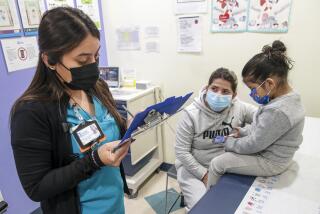Primary-care shortages hobble health system
Healthcare should be a top item of our national agenda, particularly universal healthcare (“Healthcare reform calls get louder,” Feb. 8).
Unfortunately, the primary-care workforce -- general internists and family physicians -- is not big enough to handle the current needs of the insured, let alone the projected load of the 47 million uninsured.
Part of the problem is that for decades medical schools have discouraged students from entering primary care, steering them into specialties instead.
In addition, health insurers have placed primary-care doctors at the bottom of the food chain as far as income goes, forcing them to see large numbers of patients to survive.
The low pay, high workload and lack of encouragement by medical schools make the survival of primary care doubtful. Yet in countries that provide universal care, primary care is the foundation without which it cannot exist.
This is a serious problem that lawmakers need to correct if universal care is to succeed.
Edward J. Volpintesta, MD
Bethel, Conn.
More to Read
Sign up for Essential California
The most important California stories and recommendations in your inbox every morning.
You may occasionally receive promotional content from the Los Angeles Times.









